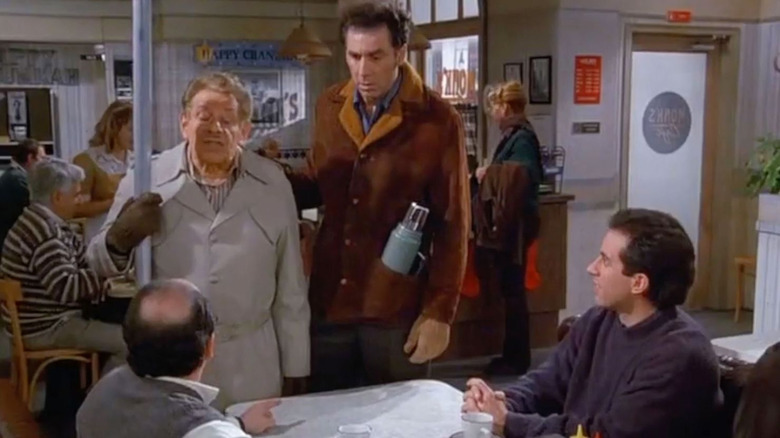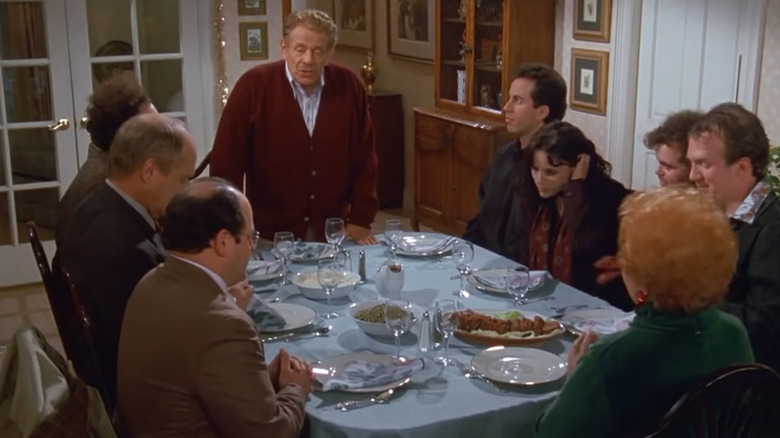The Real-Life Origins Behind Seinfeld's Festivus Holiday
The holidays are a stressful time, making them the perfect setting for sitcom episodes. That includes not only the many episodes based around Christmas, Thanksgiving, and other traditional holidays, but also the smaller, more creative ones too. And there's no other "made-up" holiday quite like Festivus, celebrated by the gang on the NBC classic "Seinfeld." In the "Seinfeld" canon, Festivus takes place on December 23 and was created by George's (Jason Alexander) father Frank (Jerry Stiller) as a way to combat the stresses of the commercialized religious winter holidays.
In the Season 9 episode "The Strike," Frank introduces others to the tradition, which includes an unadorned Festivus pole, a special airing of grievances, a dinner, and even some wrestling. It's a really fun episode and some fans have even started practicing Festivus on their own. However, it turns out that this fictional holiday actually started with something one of the "Seinfeld" writers and his family had been celebrating for decades by that point.
Seinfeld writer Dan O'Keefe envisioned a Festivus for the rest of us
The origins of Festivus are honestly pretty fantastic, with many of the great traditions on "Seinfeld" coming directly from writer Dan O'Keefe's childhood. While the Festivus pole is wholly a television invention, the rest of the show's traditions are pretty accurate to what the O'Keefe family has been doing in real life since the 1960s.
According to a 2004 interview with the New York Times, author Daniel O'Keefe (Dan O'Keefe's father) created Festivus in 1966 before his children were even born, as a fun way to celebrate a dating anniversary with his wife. (The name has no real significance, and he said he just made it up on the spot.) Once the pair had kids and O'Keefe started work on a sociology book called "Stolen Lightning," which examines how people use religion and cults to deal with the world, he turned Festivus into something more around their Ohio home. Each Festivus changed a bit and it was never tied directly to Christmas, floating around the calendar. While there was never an unadorned Festivus pole, the traditional airing of grievances and feats of strength were always a part of the festivities.
The elder O'Keefe would move the holiday around the year, and the kids would know it was time for wrestling matches and airing grievances when they came home to a clock in a bag nailed to the wall. When the O'Keefe boys got old enough, they finally refused to participate in Festivus, so their father wore a recording device and got them to air their grievances anyway ... which honestly sounds like something his fictional counterpart, the fabulously funny Frank Costanza, might do. In fact, Frank's ability to go against the grain and still be kind of lovable is a big part of what makes "The Strike" work.
How Festivus ended up on television
In a 2017 interview with The Journal News, the younger O'Keefe revealed that his middle brother Mark, also a television writer, told the "Seinfeld" producers about Festivus at a party and they thought it was too funny not to run with:
"My loudmouth brother opens his yap about it at a party where the producers of 'Seinfeld' were, and they get interested. They tell Jerry [Seinfeld]. Jerry thinks it's funny. I say I don't think it's funny, I think it's actually just kind of horrifying. And also, I don't think anyone's gonna like it. I think it's just too weird, it'll turn off the audience. They disagree, and I said all right, fine."
While starting a holiday by yelling about being disappointed in your children might be genuinely horrible in real life, on "Seinfeld" it absolutely worked because everyone is a bit of a curmudgeon anyway. The late, great Jerry Stiller is perfect as Frank, channeling Papa O'Keefe's energy as he airs his grievances and shows his strength by wrestling his son George to the floor. The Festivus of "Seinfeld" is a rejection of commercialism and religious obligation and gives people a little release around the stress of the holidays. Honestly, what's not to love about that?


